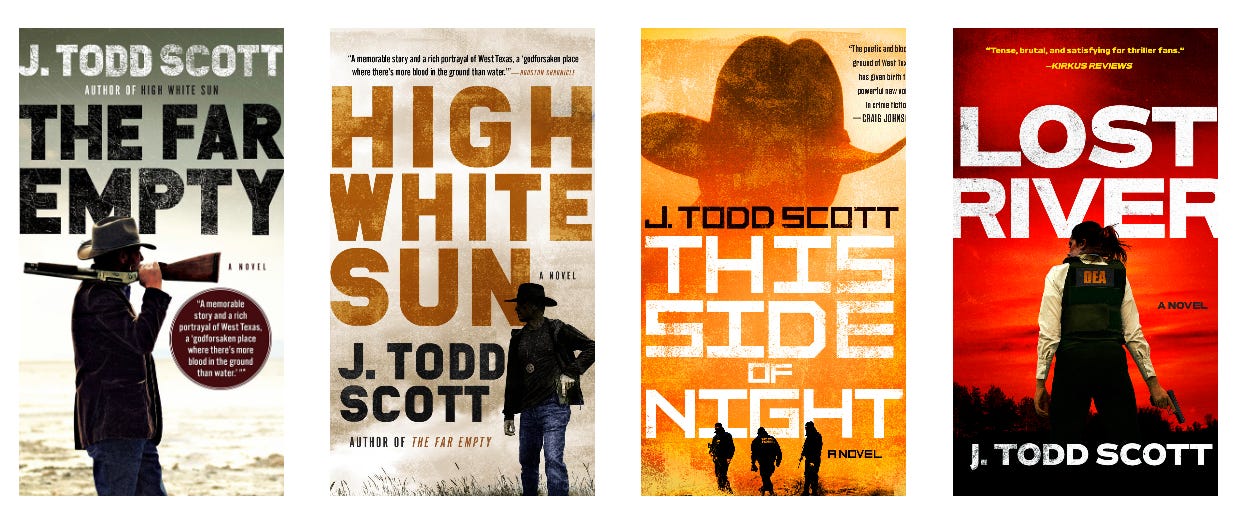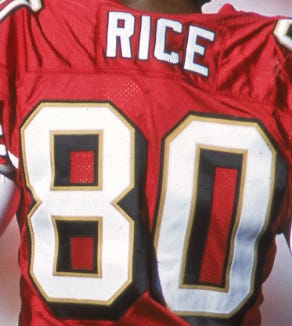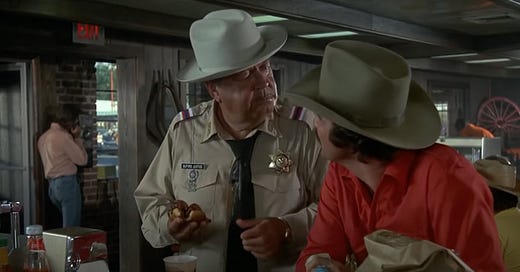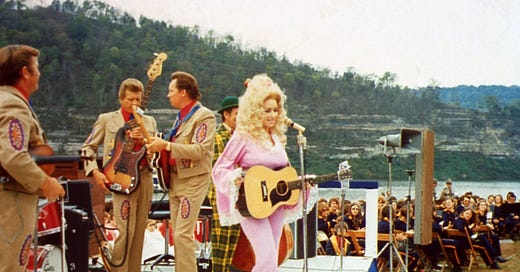

Discover more from Flashlight & A Biscuit
Welcome to Flashlight & A Biscuit, my Southern sports/culture/food offshoot of my work at Yahoo Sports. Thanks for reading, and if you’re new around here, why not subscribe? It’s free and all.
It ain’t easy, writing a thriller.
You’ve got to have a compelling lead character, a sympathetic antagonist, high stakes, sharp dialogue, a well-constructed world, knife-edge drama, the certainty that everything’s about to go straight to hell … and then, somehow, a believable path out of the madness. It helps to have a good imagination. It helps even more if you’ve lived through it already.
Many, many years ago, my college pal Todd Scott and I spent long days in a Springfield, Virginia townhouse, listening to Guns n’ Roses, reading X-Men comics, watching the NBA on NBC1, killing the occasional spider with hair spray and a cigarette lighter, and promising ourselves we’d become real writers one day.
Way leads on to way. Todd went on to serve in the DEA while I was pursuing the romantic life of a solid waste industry writer. The writing bug never really leaves you, though, and in his off hours, Todd drew on his experiences as he kept hammering away at novel after novel. Finally, in 2016, he published his first, THE FAR EMPTY, an investigative crime masterpiece set in Texas’ Big Bend. (I’ve got a cameo as a corrupt small-town deputy in that one2.)
The books came almost annually after that. He completed his Big Bend trilogy, a story of drug-running and corruption and gunfire on the border, with the publication of HIGH WHITE SUN and THIS SIDE OF NIGHT. He changed venues and subjects, turning to his home state of Kentucky and the opioid crisis, for his fourth book, LOST RIVER. His latest, THE FLOCK, is another brilliant swerve—the story of how a traumatized former cult member tries to stay alive in Colorado when the cult decides it’s not quite done with her yet.
Usually, when I’m reading my friends’ writing, I’m running it through an extra filter in my head — why did he reference this; where did she learn about that; hey, I recognize that turn of phrase from the last time we talked. But Todd — sorry, J. Todd Scott — is such a damn good writer that I forget I’m reading his stuff while I’m reading it, if that makes sense. Plus, he’s a handsome son of a gun, just look at the guy:
He’ll tell you more about this in a minute, but his writing has already kicked open doors in Hollywood that he never expected. He’s done writing for several projects in development or production, and you’ll see his work onscreen next year in “1883: The Bass Reeves Story,” a prequel/spinoff of “Yellowstone.”
Todd’s inspiring as hell, a great dude and funny as hell besides. He’s moved back to Louisville, where he’s continuing to work for the DEA while making it his mission to sample every blend of bourbon in the Bluegrass State. So go buy his books, either at the Flashlight & A Biscuit bookstore or on Amazon. (Several are under $5 on Kindle; load up your phone/iPad.) Check out his website, follow him on all the social media, and get to know him a little better right here, in a Q&A with some selective detours and in-jokes edited out.
Ladies and gentlemen, my pal J. Todd Scott:
The Flock is a very different book than your other four. What spurred its creation?
I had long wanted to write a book about a cult. I was just kind of fascinated by the mechanisms of how a cult gets started, the sort of people that get drawn into them, the lifespan of a cult. And that’s really, you know, been on a lot of people’s minds the last few years. So it’s something that had been in the back of my mind to write about, and given everything that was going on with the pandemic, it felt like the time to tackle it.
I knew very much that I wanted to approach a cult story from a different standpoint than just a traditional narrative. I didn’t want to just tell a cult story, I wanted to make a story about the story. That’s why The Flock is comprised of a bunch of epistolary material: FBI reports, script pages. I wanted to show the story that develops around a cult, or the history of a cult. That interested me as much as the cult itself.
Bram Stoker’s Dracula has that epistolary stuff in it, Stephen King’s Carrie has that epistolary stuff in it. I wanted to try my hand at it.
Dracula, Stephen King. Not really going for bunts here, are you?
Yeah, exactly!
You referenced this, but how much attention to you pay to the day-to-day news? Cults are, let’s say, bubbling below the surface. How much does the news influence what you write?
I'm not a topical writer, I'm not a political writer. I don't look for things in the real world, and necessarily try to put them in my books. But you know, it just so happened that I was writing a book about a cult, and conspiracy theories and belief systems and all that, at a time when a lot of that was in people's consciousness. And so that made it easy. My cult, the Ark of Lazarus, touches on a lot of current events and organizations and conspiracies. I had the idea independently of that, but it all just kind of came together in a nice bit of synergy.
You and I, when we were starting out, were reading a lot of awful “literary” fiction and comic books. And then you went into the DEA. How has that influenced your writing in a way you wouldn’t have expected way back when we were just a couple of dreaming idiots?
Cops are by their nature storytellers. On the one hand, when you’re writing reports and case files, you have to tell a story that you can make sense to a jury, right? So there’s that part of it. But then the other part is, you spend a lot of time sitting around doing nothing. I always say, the job is interesting, but it’s not always exciting.
If you’re spending long hours on surveillance in your car, what do a bunch of cops sit around and do but tell stories to each other? That’s naturally what happens. You tell stories about your life, tell stories about things that are going on with your kids, tell stories about the job. Some of the best natural storytellers I’ve met are local deputies, or other agents from other agencies, or law enforcement from other countries. I’ve worked with Royal Canadian Mounted Police, and I’ve worked with Australian federal police. So you sit around and tell a lot of stories.
Although I didn’t write seriously for many years, it’s not like I wasn’t listening to stories, writing my own stories in the case files, then listening to people’s stories from all over the world.
We’re at a time now when distrust of the cops, distrust of law enforcement is just off the charts. How does that affect you personally?
That distrust is earned, to some extent. I believe very much that as a civil servant, as someone who carries a badge and a gun, that I have a responsibility to do my job as safely, sensibly and professionally as possible. I owe that to the people that I’m supposed to protect and serve. And I think that we in law enforcement need to be as transparent as possible about the work that we do. The work that we do is extremely difficult, probably more difficult now than at any other time in history. Because it’s not simply about law enforcement.
Really, I’m talking about uniformed officers. I mean, they’re on the front lines, engaging with people every day. And often times, it’s not just about broken laws, it’s about confronting or engaging broken people who are suffering from mental illness or a whole host of other emotional problems. So it’s very difficult to do what we do every day. But if we don’t do it well, and if we don’t do it professionally, then I expect that we should be held accountable for that, because we have a tremendous amount of authority.
I can put people in jail. I carry a gun, which gives me the ability to fatally injure someone. If we in this profession don't take that seriously, and we don't do our job exceptionally well, then I think we deserve the scrutiny that that we've gotten.
I don’t know that I’ve ever asked you this. What brought you to the DEA from where you grew up?
Lethal Weapon! I’d like to say something cooler, something more noble than that. But it’s not. In college, we saw Lethal Weapon, and I thought, you know what, between Lethal Weapon and other movies, I thought, You know what? Being a federal agent would really be a cool thing to do. And it’s proven to be true.
I worked at the Williamsburg Inn there for a bit, and I met Secret Service agents working there, because there was a five-star restaurant there and you’d have dignitaries visiting. And they were great guys. I knew immediately I didn’t want to do Secret Service, but I thought the idea of being a federal agent would be interesting. I looked at the FBI and the DEA, and decided the DEA was the closest to being Mel Gibson and Lethal Weapon that I could get. I didn’t have to wear a uniform, I could wear jeans and a t-shirt. And when I got hired on, I got sent out to LA, and there I was in Los Angeles, just like Martin Riggs, except for the mullet.
And the sexy saxophone soundtrack.
Right!
What’s your best DEA story that you’re able to tell?
I’ve done a lot of interesting things. I spent time undercover out in the South Pacific. I’ve done a lot of undercover work locally.
This is a good story. One time here in Kentucky, when I was a younger agent, I was in court, and I had on a suit and tie and a trench coat. I was late showing up to this operation because I’d been in court. So I’m in the car all dressed up in the suit. And the guy that we were there to do this dope deal with runs, and he’s running in the darkness and rain. And so I’m running after this guy in the suit and this ridiculous long trench coat.
He was running from one direction, I was coming from another, and I tackle this guy like a football player. I flipped him over the hood of the car because he never saw me. And as I’m there cuffing him, and the rest of the guys are coming up, and he’s like, “I thought you were Batman!”
Batman! You are living the damn dream.
I am living the damn dream! I’ve done a lot of very, very interesting things, and I’ve been very fortunate with my career.
Are you allowed to write a memoir? Is that something you’d be interested in?
I can, but I’ve always found that my life is like I said before, always interesting but not always exciting. The fingerprints of my career are in my books, particularly the first three. They were set in the Big Bend, and although my whole career wasn’t spent out there, you’re talking about cartels and drug dealing. And then Lost River, that’s very much the sort of dope work I was doing as a street agent.
Those four books touch on a lot of the things that I’ve seen in my career. Those stories reflect a lot of what I’ve been involved with in the DEA — not the international stuff so much, because they’re all domestic, but the undercover work, surveillance and the cartels, overdoses, the opioid crisis, all those things I’ve had to deal with. Those books reflect as much of my career as I think anybody would be interested in hearing about.
Lost River was my absolute favorite. I mean, I love all your books. But with that one, you leveled up.
I always wanted to write a book about home, and I knew I wanted to write about the opioid stuff. I thought Lost River came together really well. Unfortunately, it was a book that released in the pandemic, so as many authors can attest, it was a tough time for any book to get traction. That's a book I felt like didn’t get the attention that I hoped it would — not necessarily because I wrote it, but because I thought it said some interesting things about the opioid crisis, particularly from someone who has seen it like I have.
If you had said, Hey, an agent or a cop is going to write a book about the opioid crisis, I don’t know that Lost River is the book that you would have expected someone who carries a badge and gun would have written about it. I tried to be much more even-handed and fair about the problem than I think sometimes you might expect someone in law enforcement to be. More sympathetic, empathetic, I guess.
Tell me about the TV writing. How did that come together?
I was very fortunate that all the books I’ve written have been optioned at one point or another for film or TV, which means nothing other than somebody gives you a check for them. And then they sit in some producer’s drawer for awhile. But as a result of that process, I got to meet various producers, and then other screenwriters and showrunners.
As a result of that process, I got to know an actor very well, who was trying to write a movie himself. And so I was brought on to help write that movie. And then, as a result of that, I was brought on to write an original audio series. And then as a result of that, an unpublished book was optioned by a studio, and then they hired me to write the script for that book.
I got known by folks all because of my novel writing, and I had to teach myself script writing. But I was given some opportunities by people who were very generous, and who thought I was a pretty decent writer. So when the Bass series got picked up, some folks that I had dealt with on The Far Empty option and other stuff reached out and said, “Hey, we know you like Westerns, would you be willing to come help out and try your hand at some writing?” And so I did, and it was a great experience.
You’re a Kentucky guy. What’s your go-to bourbon?
You’re talking to somebody who’s got a bourbon bar in his basement! Right now, my favorite is Wild Turkey Rare Breed.
And then it kind of devolved from there, but you get the idea. Support good writers and good writing, my friends. Thanks for hanging, and we’ll catch you right back here next week!
—Jay
This is issue #80 of Flashlight & A Biscuit. Check out all the past issues right here. Feel free to email me with your thoughts, tips and advice. If you’re new around here, jump right to our most-read stories, or check out some of our recent hits:
How would Forrest Gump fare playing football for Alabama today?
There’s a reason why dueling is illegal
Why Atlanta’s Varsity has the best burger ever. No, I’m serious.
Remembering Loretta Lynn, an icon without equal
Could you survive a Waffle House brawl?
What does “Flashlight & A Biscuit” mean, anyway?
If you dig this newsletter, share it with your friends. Invite others to the party, everyone’s welcome
Hearing “Roundball Rock,” the NBA on NBC theme song, takes me right back to those lazy-ass Sunday afternoons watching Jordan, Barkley, Ewing et. al. It’s still my favorite sports theme song ever.
“Busbee owned a goddamn tow truck. It wasn’t unusual for Busbee to pull people out of ditches while still in uniform and then write them a ticket afterward.” What a jerk.
Subscribe to Flashlight & A Biscuit
Kick back with some tales of Southern culture, sports, food and music from Jay Busbee. Grill's already hot; drinks are on ice. Pull up a chair.















